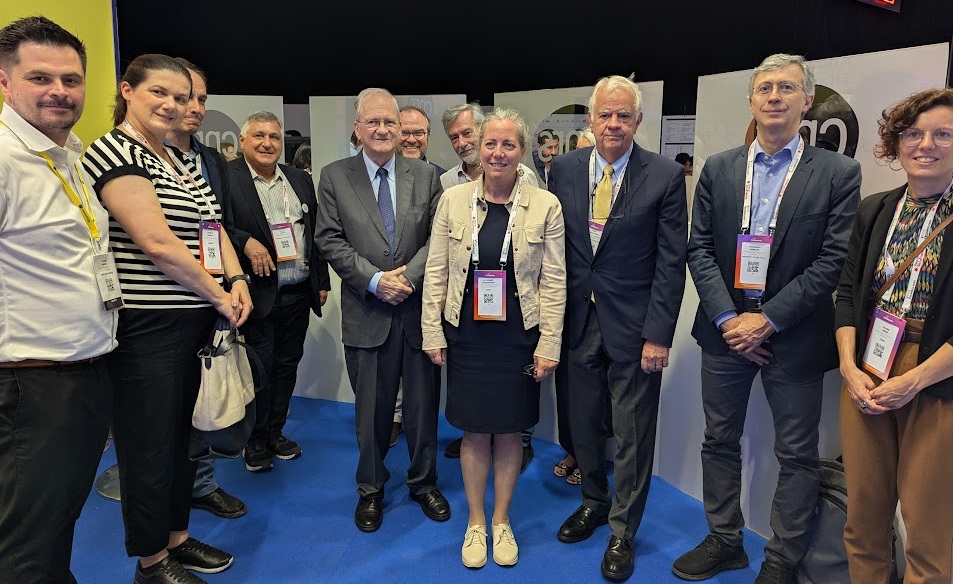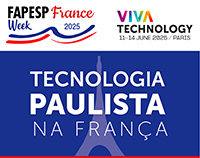

FAPESP has one of the oldest and most successful cooperation agreements with the CNRS (photo: Heitor Shimizu/Agência FAPESP)
Delegation visiting France to participate in FAPESP Week learns about the instruments available at the French National Center for Scientific Research to support innovation and startups.
Delegation visiting France to participate in FAPESP Week learns about the instruments available at the French National Center for Scientific Research to support innovation and startups.

FAPESP has one of the oldest and most successful cooperation agreements with the CNRS (photo: Heitor Shimizu/Agência FAPESP)

By Heitor Shimizu, from Paris | Agência FAPESP – FAPESP executives and research center coordinators visited the National Center for Scientific Research (CNRS) stand during VivaTech (https://vivatechnology.com/), a technology fair held in Paris from June 11th to 14th. The CNRS is France’s largest research funding agency.
“With the CNRS, FAPESP maintains one of the oldest and most successful cooperation agreements with international research institutions. This collaboration has already resulted in support for hundreds of research projects conducted by researchers from the state of São Paulo in collaboration with French colleagues, as well as support for initiatives in a wide range of fields of knowledge – such as the recent creation of the Worlds in Transitions International Research Center, the branch of the Institut Pasteur at USP, and joint support for the International Panel on Ocean Sustainability,” said Marco Antonio Zago, President of FAPESP.
The FAPESP delegation was received by Thomas Ribeiro, Director of Development and Monitoring; Catherine Grandhomme, Director of Corporate Relations; and Solene Marie, Head of the Americas Sector at the CNRS. Ribeiro presented some of the French agency’s instruments aimed at supporting innovation, with a special focus on startups – the main highlight of the CNRS’s participation in VivaTech.
“We have a long-standing and successful program to support startups, through which we’ve already financed around 1,900 small companies – not just startups, but also established businesses. Some of them have been very successful and have become large companies,” Ribeiro told Agência FAPESP.
“We’re now developing a new initiative in the area of innovation aimed at the phase prior to the formalization of companies. The goal is to support projects until they reach Technology Readiness Level 3 – that is, proof of concept on a laboratory scale. This stage is essential for projects to subsequently attract funding and move forward,” he explained.
“We also offer a methodological support program aimed at helping researchers make the transition from scientist to entrepreneur. We accompany them on this journey and prepare them for the challenges of entrepreneurship. All of this takes place before the company is formally established. After this stage, we offer free services to startups, contributing to their accelerated growth with knowledge, assets, and connections,” said the CNRS director.
“One of our main objectives is to open access to our network of partners – industrial, financial, institutional, and also international, such as FAPESP itself. This represents an excellent opportunity for startups to access new markets,” said Ribeiro.
The following people participated in the visit to the CNRS stand: Fernando Menezes, Administrative Director of FAPESP; Raul Machado, Advisor to the President of FAPESP and Coordinator of FAPESP Week; Niels Olsen Saraiva Câmara, Advisor to the Scientific Board of FAPESP; Patrícia Tedeschi, Innovation Manager at FAPESP; Julio Meneghini, Executive and Scientific Director of the Research Center for Greenhouse Gas Innovation (RCGI); Karen Mascarenhas, Director of Human Resources and Institutional Communication at the RCGI; Paulo Artaxo, Professor at the Physics Institute at USP; and Carlos Labate, Coordinator of the Multi-user Proteomics, Metabolomics, and Lipidomics Laboratory at the Luiz de Queiroz School of Agriculture.
FAPESP’s participation in VivaTech is part of the FAPESP Week France program. For more information, visit: fapesp.br/week/2025/france.
Republish
The Agency FAPESP licenses news via Creative Commons (CC-BY-NC-ND) so that they can be republished free of charge and in a simple way by other digital or printed vehicles. Agência FAPESP must be credited as the source of the content being republished and the name of the reporter (if any) must be attributed. Using the HMTL button below allows compliance with these rules, detailed in Digital Republishing Policy FAPESP.





